This post may contain affiliate links.Please read our disclosure policy.
Krapfen (German donuts) are a fluffy, classic German pastry, you can get at any bakery. A simple fried yeast dough filled with jam and dusted with sugar.
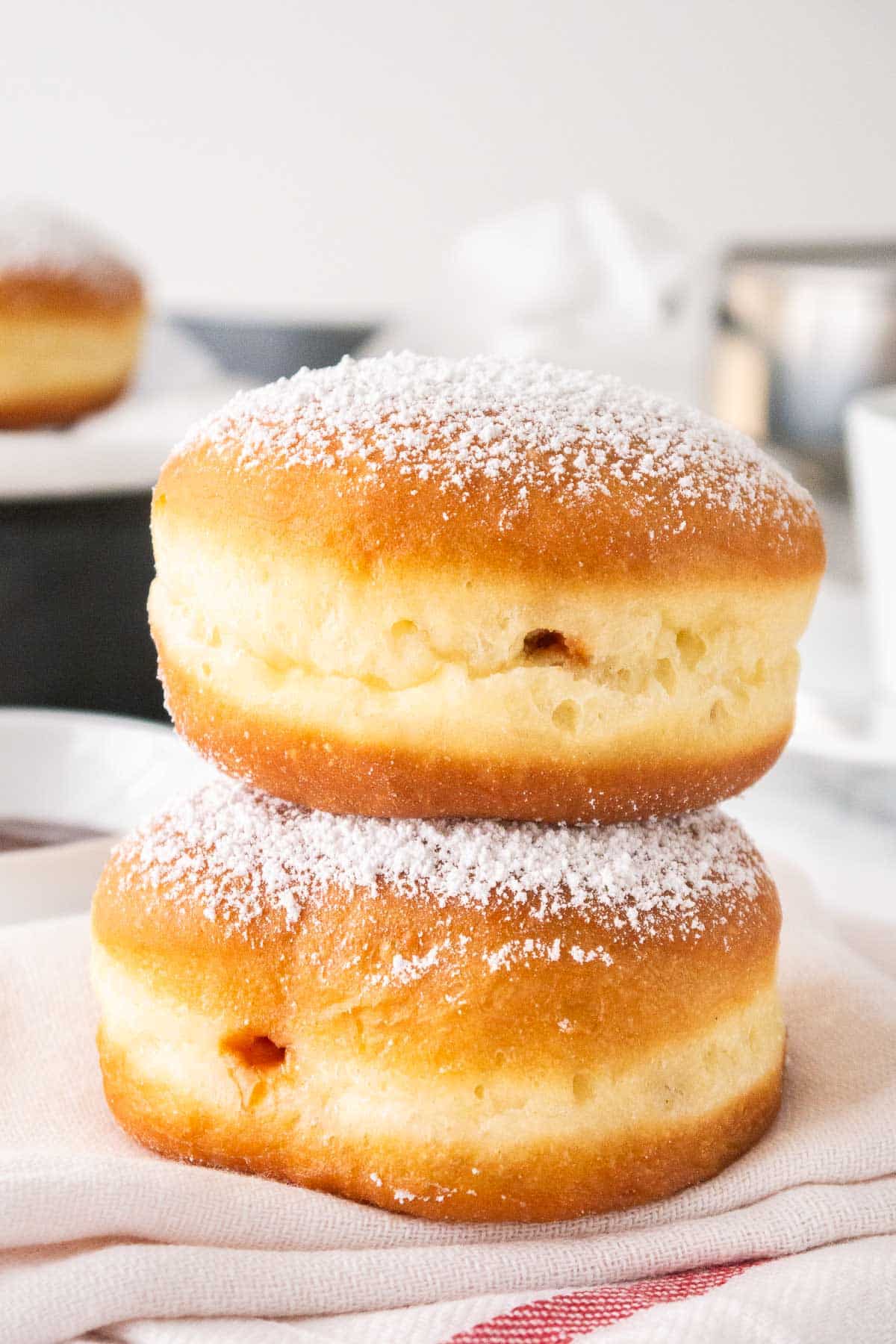
Krapfen are popular in all German-speaking countries and are also known as Kreppel, Berliner, or Pfannkuchen. They are golden brown on the outside with a white ring in the middle, fluffy inside, filled with jam, and topped with powdered sugar.
The filling differs like the name from region to region. In Franconia where I come from, they are traditionally filled with rosehip jam, in Berlin with plum jam, and in Austria with apricot jam. A personal favorite of mine is a vanilla custard or chocolate spread filling.
You can get Krapfen year-round at every German bakery but they are most popular during Fasching (carnival) which is a big thing in many parts of Germany. Then you can get them with many more fillings from Cappuccino Krapfen to Schwarzwälder Kirsch Krapfen (Black Forest Cake Donuts).
There are also different varieties of Krapfen: ausgezogene Krapfen, popular in Franconia, and Munich, and Quarkbällchen, made with quark instead of yeast.
Table of Contents
Why you’ll love this recipe
- Authentic German recipe: I’m German and I love Krapfen. This recipe tastes exactly like from my favorite German bakery.
- Simple Ingredients: This recipe uses simple ingredients that you have on hand.
- Flexible: You can use any filling you like from a simple jam filling to a delicious vanilla custard.
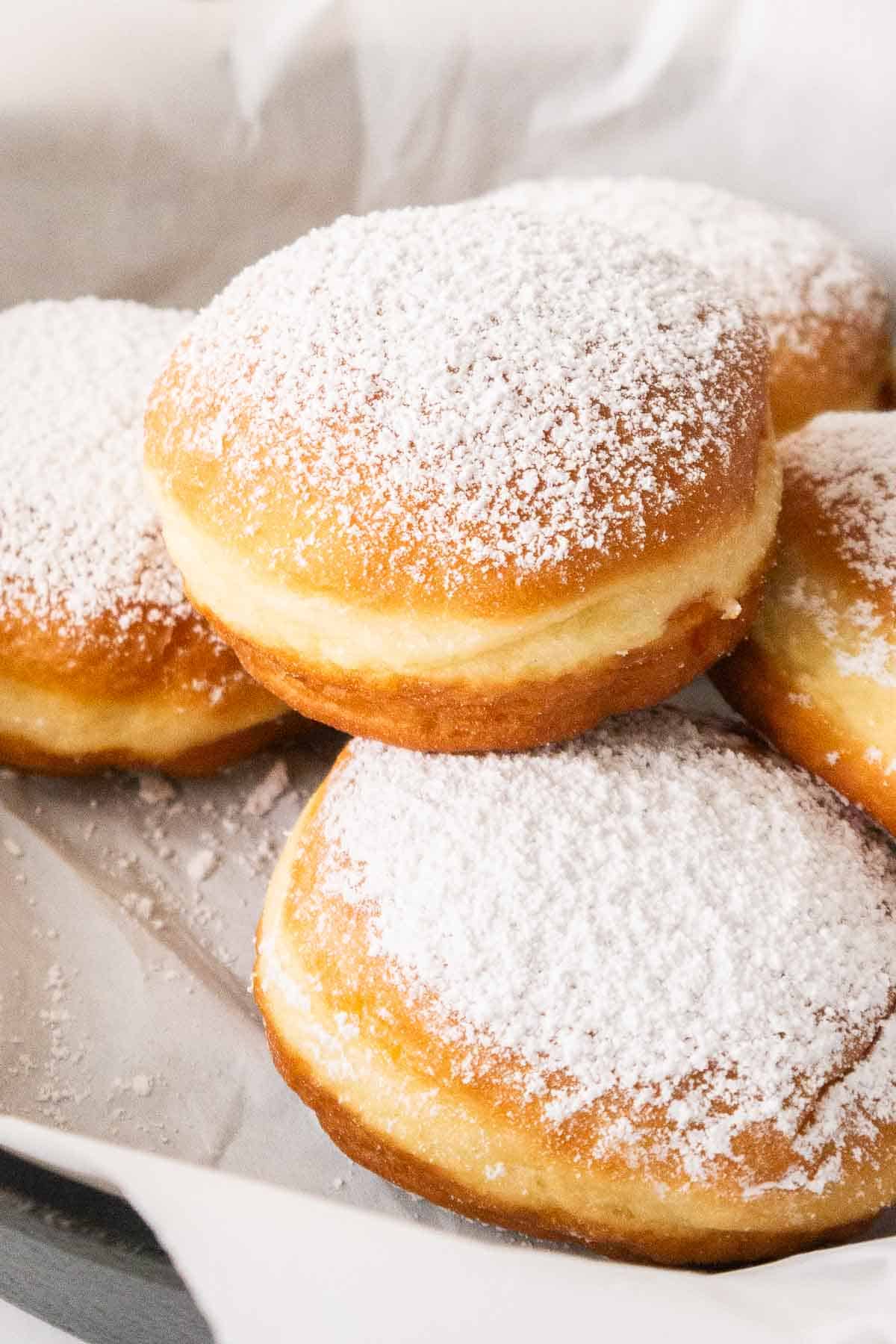
Ingredient notes
Here is an overview of the ingredients you’ll need for this recipe. Scroll down to the recipe card at the bottom for quantities.
- Milk – The milk needs to be heated until it’s lukewarm, about 95 degrees F. Make sure it’s not hotter or the yeast won’t work.
- Yeast – You can use instant or active dry yeast for this recipe. In Germany, it’s common to use fresh yeast, it rises faster but is difficult to get outside of Germany.
- Sugar – There is only a small amount of sugar in the dough. More sugar would make the Krapfen brown too fast. The sweetness comes mostly from the filling and the sugar on top.
- Butter – Use unsalted butter and let it sit on the counter for about 30 minutes so it is at room temperature.
- Eggs – You need two large, room-temperature eggs and two additional egg yolks. The egg yolks make the dough soft and add a touch of color.
- Vanilla – I recommend using vanilla sugar but you can also use vanilla extract.
- Flour – You need all-purpose flour for this recipe, don’t use self-rising flour. Make sure to measure the flour correctly using the spoon and level method so the Krapfen are fluffy.
- Jam – Use your favorite jam or jelly to fill the Krapfen. Rosehip jam is traditional in Bavaria but you could also use raspberry jam or any other smooth jam or jelly.
- Powdered sugar – I prefer powdered sugar to dust the Krapfen. In some German regions, they are also coated in granulated sugar.
Did you know?
In Bavaria they are known as Krapfen, in Hessen they call them Kreppel, some call them Berliner but the people from Berlin call them Pfannkuchen (and Pfannkuchen are called Eierkuchen or egg cakes in Berlin)
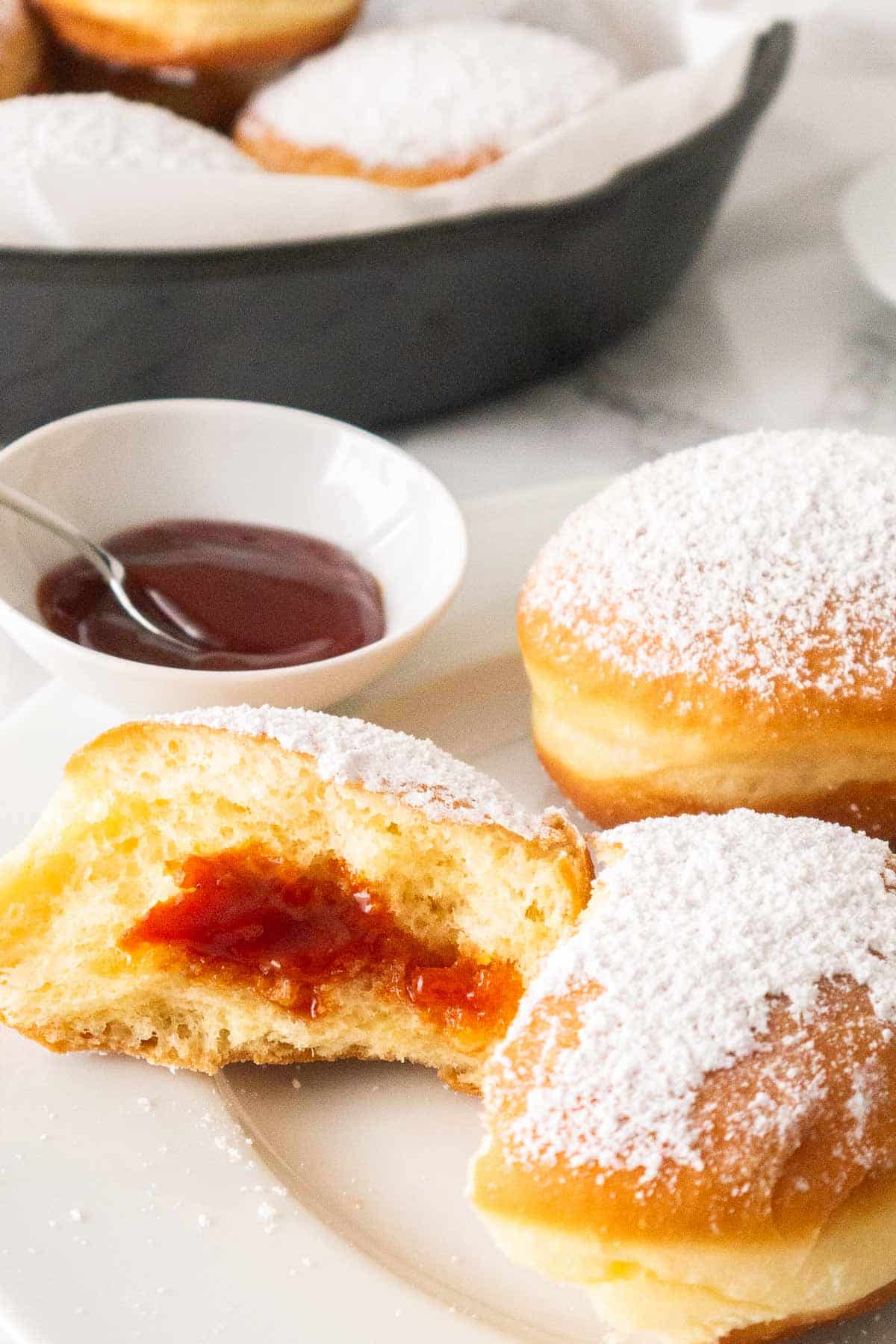
Expert tips for success
- Ingredients – Make sure all your ingredients are at room temperature. I recommend using a scale and switching to the metric measurement in the recipe card for the best results.
- Yeast – For the best results make sure your yeast is not over its expiration date and make sure the milk is not too hot otherwise the yeast will not work.
- Rum – Adding a tablespoon of rum to the batter makes the Krapfen soak up less fat during frying.
- Frying – Make sure the oil has the right temperature. You can use a deep fryer or a pot. If you’re using a pot like I do don’t fill up the oil higher than 1/3 and be sure to control the temperature with a cooking thermometer.
- Filling – The filling should be in the middle so you need a piping bag with a long piping tip (affiliate link) to fill the Krapfen, you could also use a plastic squeeze bottle. Use a skewer to poke a hole into the donut so it will be easier to fill. You can use any jam or filling you like (see more ideas below) but it shouldn’t be chunky.
- Topping – Wait until the Krapfen have slightly cooled down before dusting them with powdered sugar otherwise the sugar will melt.
Recipe FAQ
Krapfen are round pastries made from yeast dough, filled with jam or other fillings, and dusted with powdered sugar. Pennsylvania Dutch fasnachts are usually potato doughnuts with straight sides that are uncoated, or dusted with table or powdered sugar.
Both are made from yeast-raised dough and deep-fried but donuts usually have a hole in the middle and Krapfen doesn’t have one. Krapfen are also a bit more chewy and always have a filling. If you’re looking for a recipe for donuts check out my Air Fryer Donuts recipe.
Yes, you can make this recipe without a stand or hand mixer. Make sure to need the dough for about 10 minutes for the best results.
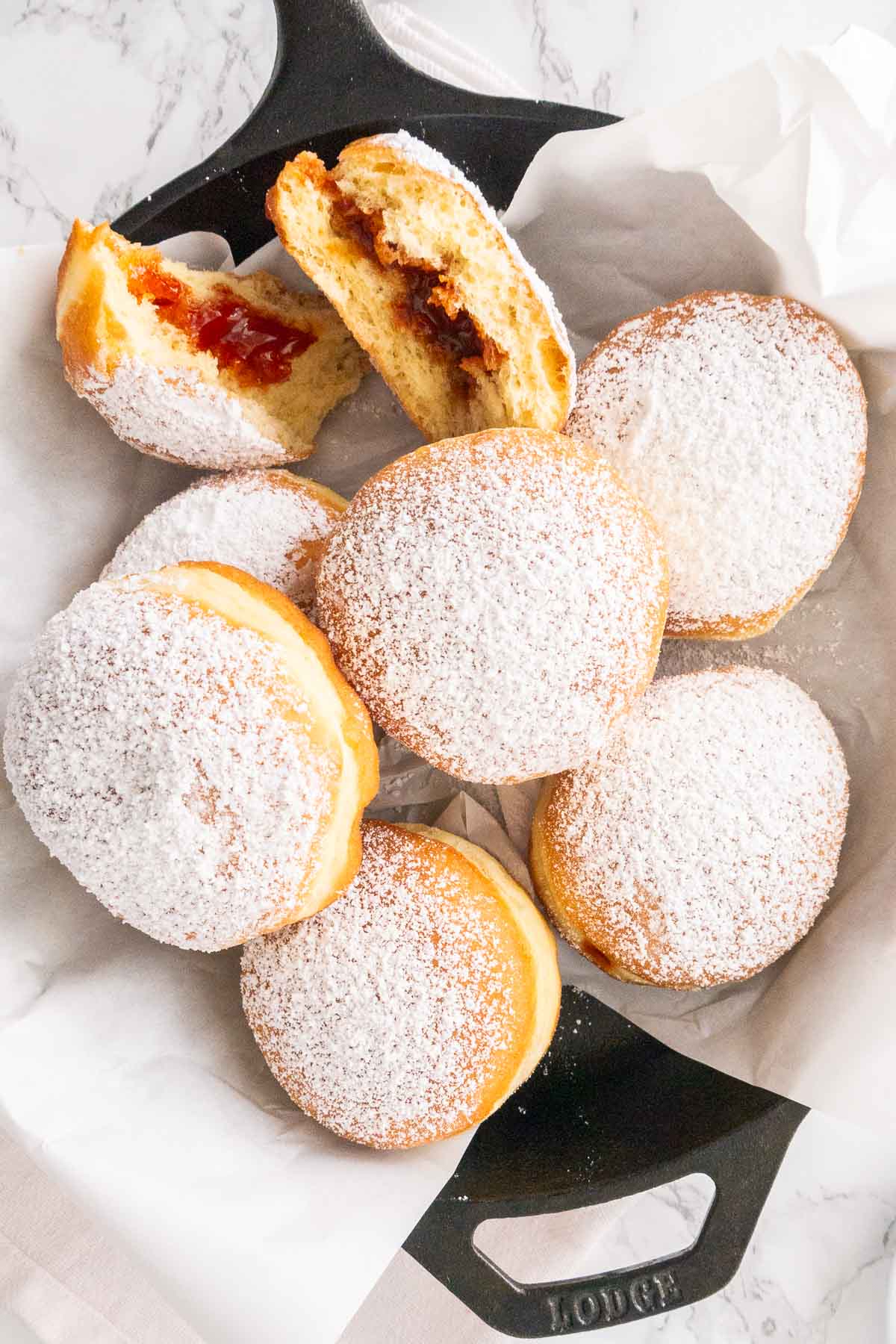
Fillings for Krapfen
Berliner can come with many different fillings but if you order a Krapfen at a bakery in southern Germany it will most likely come with a rosehip jam filling.
The filling should be smooth without seeds or chunks. Here are a few more ideas:
- Rosehip Jam
- Apricot Jam: Most popular filling in Austria
- Raspberry Jam
- Vanilla custard
- Chocolate custard
- Rose jam or plum jam: These two fillings are popular for Polish donuts (Paczki). Krapfen and Paczki are very similar, only the filling and topping differ.
- Mustard: A common German practical joke is to fill one secretly with mustard and serve it with jam-filled ones without telling anyone.
Make-ahead, storage, and freezing
German donuts are best eaten fresh, after 1 day they get dry but you can freeze them (without sugar on top).
If you want to store leftover donuts, put them in an airtight container on the counter and eat them the next day.
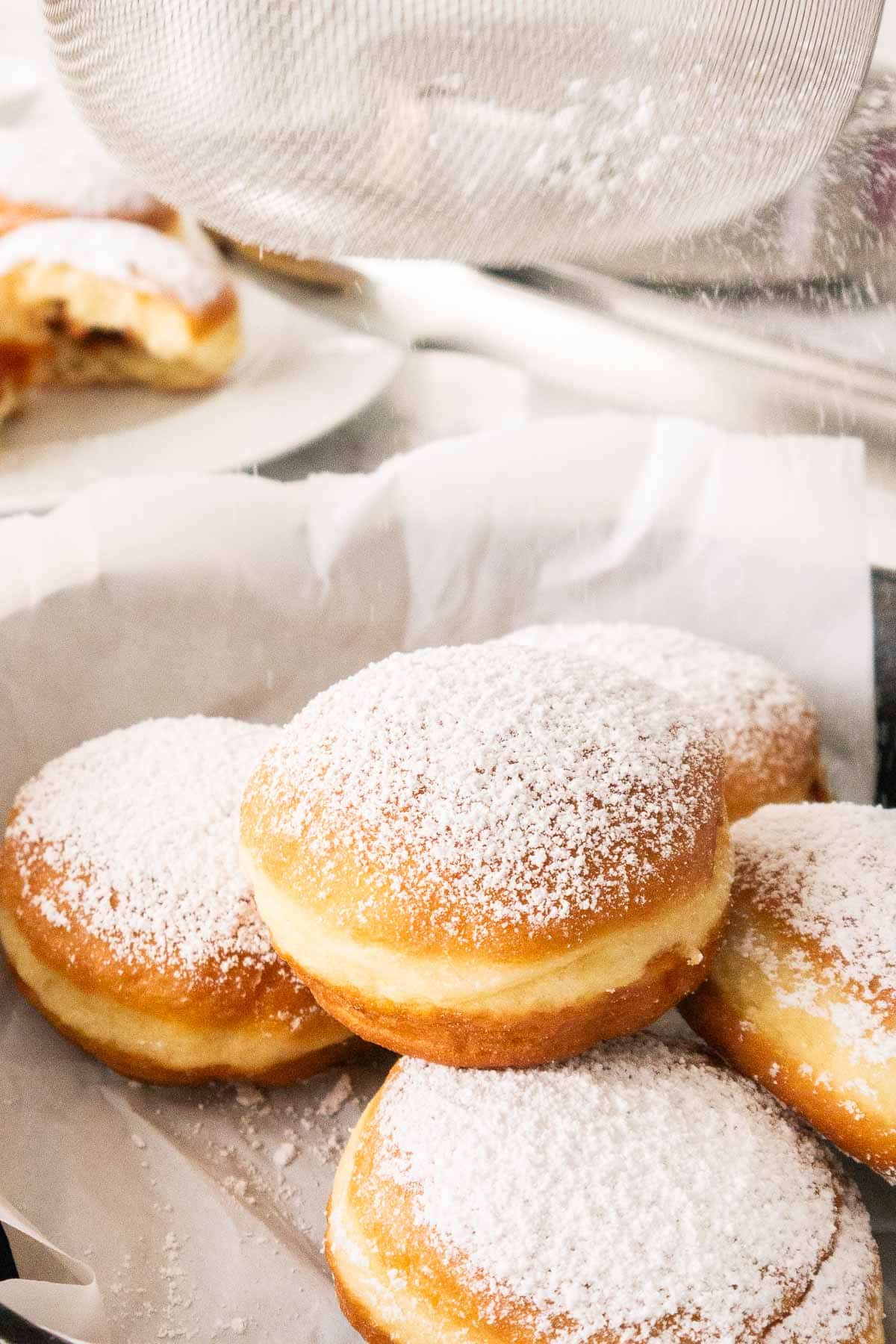
More German bakery favorites
Bread & Muffins
Bavarian Pretzels
Cakes
Apple Strudel Recipe
Bread & Muffins
Hefezopf
German Recipes
German Cheesecake
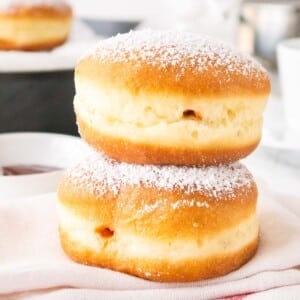
Krapfen (German Donuts)
Ingredients
- ¾ cup milk
- 4 tsp instant yeast, or active dry yeast
- ¼ cup sugar
- ¼ cup unsalted butter, room temperature
- 2 large eggs, room temperature
- 2 egg yolks
- ½ tsp vanilla sugar, or vanilla extract
- ½ tsp salt
- 1 tbsp rum, (optional)
- 4 cups all-purpose flour
- 6 cups frying oil
- 1 cup jam, or your favorite filling
- powdered sugar
Instructions
- Heat up the milk until it’s lukewarm (100°F). Pour the warm milk into the bowl of a stand mixer fitted with a dough hook attachment and sprinkle the yeast and the sugar on top of the milk. Give it a light stir (with a spoon) and let it sit for 2 minutes.
- With the mixer running at low speed, add the softened butter, eggs, egg yolks, vanilla, salt, and rum. Mix until everything is well incorporated.
- Add the flour and knead on low speed for 3 minutes until a soft, slightly sticky dough has formed.
- Put the dough in a greased bowl, cover it with plastic wrap, and place it in a warm environment to rise until doubled, about 30 minutes to 1 hour.
- Once doubled in size, remove the dough from the bowl and turn it out onto a lightly floured surface. Knead the dough to release any air bubbles and then roll the dough out until it’s about as thick as a finger. Use a glass or something else approximately 3 inches in diameter to cut out 20 dough circles. Arrange them on your lightly floured surface so they don’t stick to it, then loosely cover them with plastic wrap and allow to rise until doubled in size and puffy, about 30 minutes.
- Heat oil in a deep fryer to 320°F (160°C). If you don’t have a deep fryer, you can use a normal deep pot. Be careful, don’t fill up the oil higher than 1/3 and be sure to control the temperature with a cooking thermometer. If the oil gets too hot your donuts will get too dark and if it’s too low they won’t cook through.
- Put 2-3 dough balls into the hot oil. Fry them for 3 minutes on one side. Try not to get oil on the top of the donut while frying the bottom, it won’t rise properly. Flip them and fry the other side for 2 minutes. Use a slotted spoon to transfer the donuts to paper towels to drain. Test the first donut to be sure it is completely cooked and adjust the frying time if necessary.
- Fill the German donuts with your favorite filling. A piping bag with an extra-long tip works best.
- Dust with powdered sugar and serve on the same day!
Notes
- Ingredients – Make sure all your ingredients are at room temperature. I recommend using a scale and switching to the metric measurement in the recipe card for the best results.
- Yeast – For the best results make sure your yeast is not over its expiration date and make sure the milk is not too hot otherwise the yeast will not work.
- Rum – Adding a tablespoon of rum to the batter makes the Krapfen soak up less fat during frying.
- Frying – Make sure the oil has the right temperature. You can use a deep fryer or a pot. If you’re using a pot like I do don’t fill up the oil higher than 1/3 and be sure to control the temperature with a cooking thermometer.
- Filling – The filling should be in the middle so you need a piping bag with a long piping tip (affiliate link) to fill the Krapfen, you could also use a plastic squeeze bottle. Use a skewer to poke a hole into the donut so it will be easier to fill. You can use any jam or filling you like (see more ideas below) but it shouldn’t be chunky.
- Topping – Wait until the Krapfen have slightly cooled down before dusting them with powdered sugar otherwise the sugar will melt.
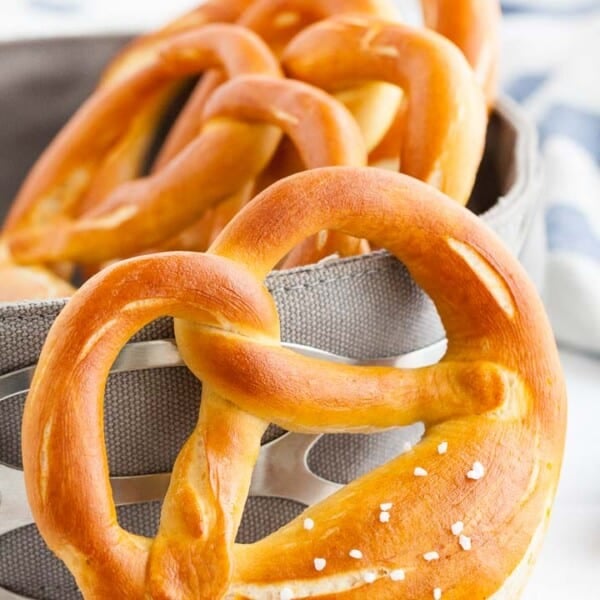
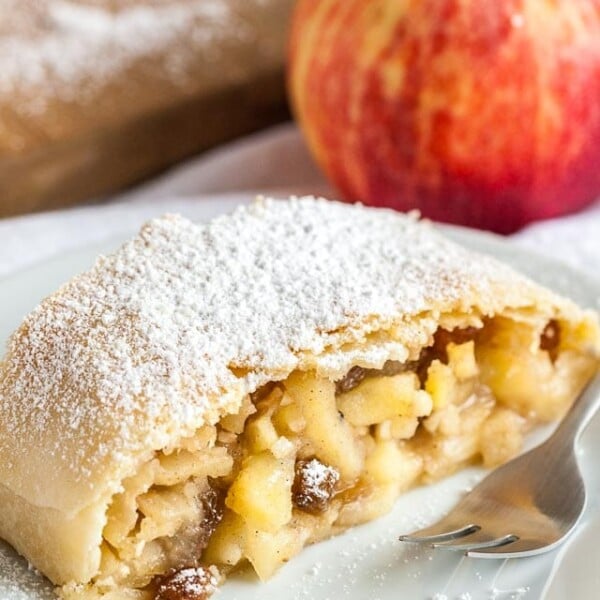
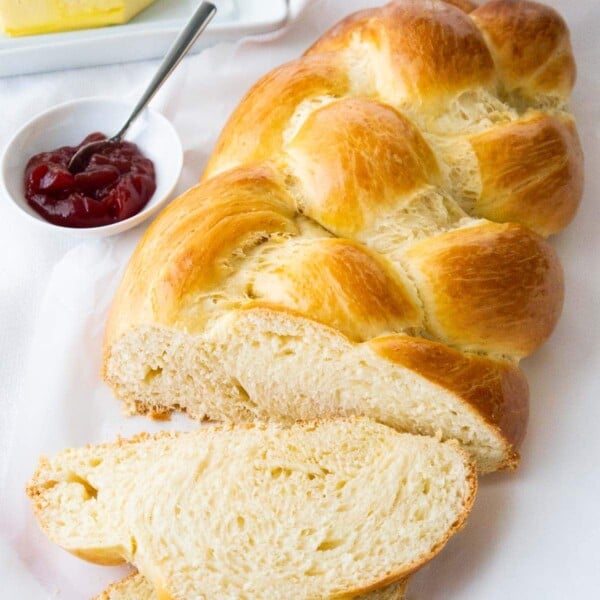
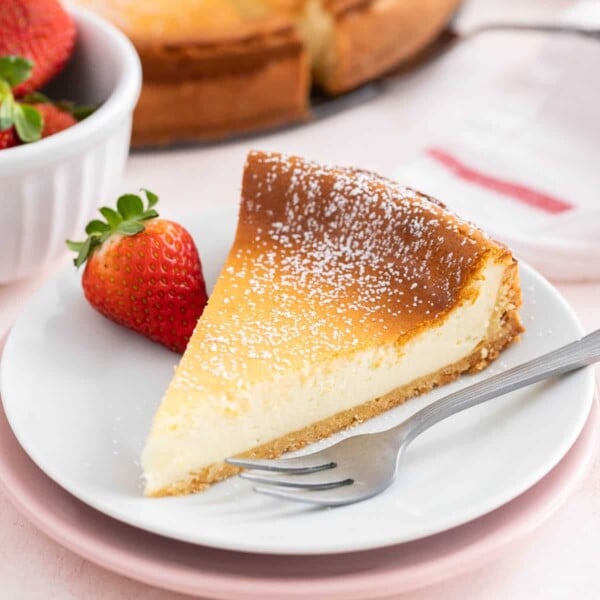
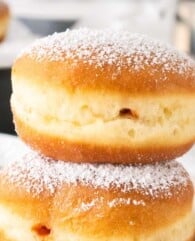
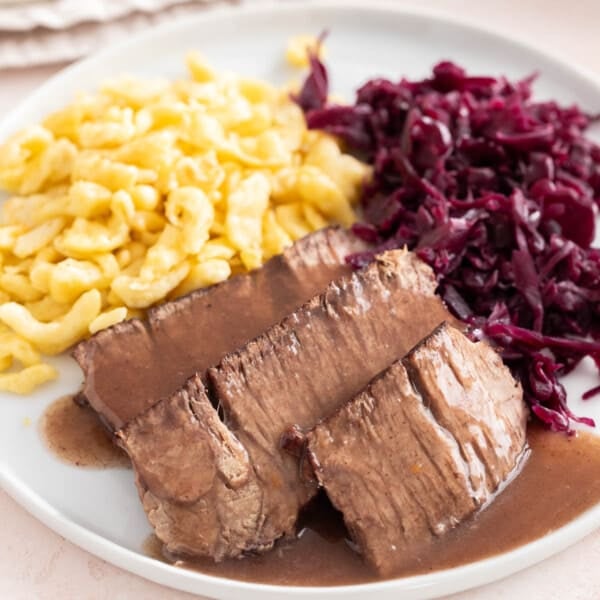
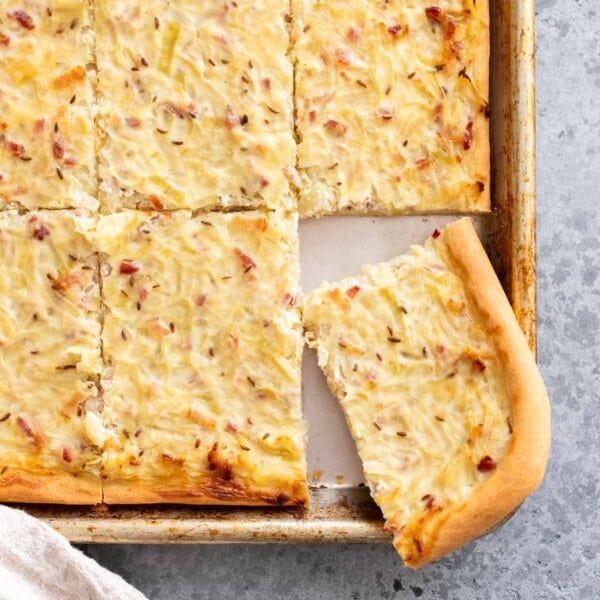
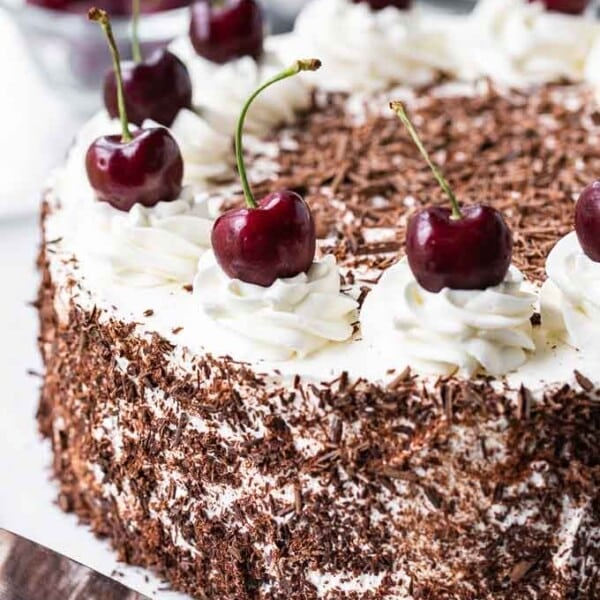
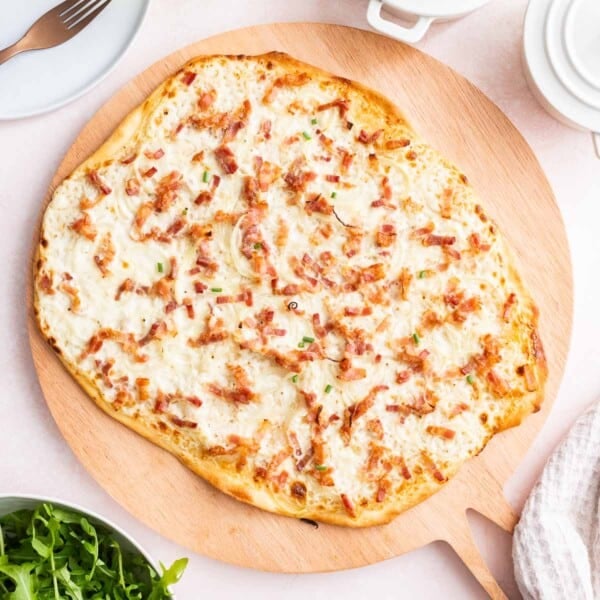






My grandma used to make these. Sure brings back memories to see this recipe.
Yum! Would these work on the air fryer or do you think they would be too thick?
Good question! I’m not sure, but I will add it to my recipe testing list.
I’m a little intimidated by frying but I want to try these so bad! Lol-I hope I never bite into a mustard filled one though.
Um yum!!! They looks so fluffy. These look waaaay better than any carnival Donut I’ve ever had. Yum :D
These remind me of my childhood. my dad loved jelly donuts
These are the most beautiful doughnuts I’ve ever seen! Really. I’ve never made jelly-filled before, but after seeing yours I think I have to!
Oh, the mustard joke – love it :) These are beautiful donuts — I’d love a cream filled one!
These donuts look amazing! The jelly filling and the powdered top are definitely the way I would want them, too. I’ve never heard of Fasching but if it means these carnival donuts, then I am a fan :) This is going to make the perfect weekend brunch plan!